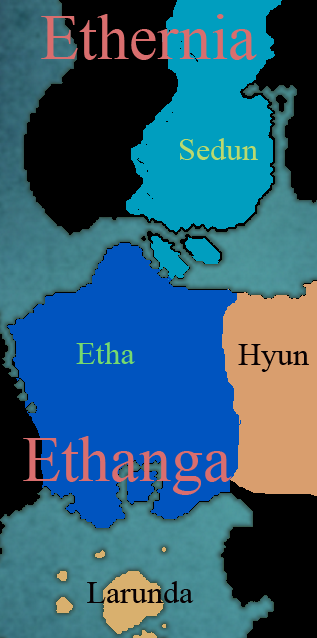
The Treaty of Jahamen was the event which brought peace between Ethernia and Etha and established the monarch of Sedun as the recognized sovereign of all of Ethernia.
The treaty of Jahamen was created to bring peace between two warring states, Etha and Sedun.
There are several main sections within the treaty.
The beginning portion contains an oath from both sovereigns, declaring their will to end hostilities between their kingdoms and uphold a lasting peace. Both Glerigh and Isora signed after the oath section.
The next section contained the concessions and compromises between the two.
The final section outlined the appropriate action should the other party break the treaty.
The consequence of Isora's or her descendants breaking their terms was the revocation of Ethain recognition of their status as sovereigns over all of Ethernia.
The failure of the Ethains to hold up their end of the agreement would spur the Seduni kingdom to again invade.
In addition, Isora would follow through with the agreement only if she was allowed a special, unwritten, request from the baron and baroness of Jahamen.
The Document is publicly accessible online and can be viewed at the Tyro national museum of Etha.
The status of the Treaty rested under a sort of early and recognized international law between the two parties.
In the years prior to the signing of the treaty, Isora Mezezi had invaded Etha from the north as retaliation for an Ethain attack on an allied island. After much success, Isora's forces were eventually forced to slow down their success, and worrying that the Ethains may seize the advantage and that her heir, who had fled to Etha, might end up in enemy hands, Isora sought to end the war.
The historical significance of this document is great. Not only did it stop possible Ethain expansion into Ethernia, it forced the Ethain king to recognize the queen of Sedun as an equal and as the sovereign over all of Ethernia, just as he was over all of Ethanga. Furthermore, the two royal families would refer to each other as kin and even marry into the other.
It stopped Ethernian raids into Etha and established a long-lasting friendship between the two nations.
Although the treaty was initially unpopular in Etha, as the king was forced to pay a massive tribute and had to recognize the Ethernian queen as an equal, the end of the war and the lack of future Ethernian raids was evidently preferred by the populace.
In Ethernia the treaty was popular, in that it showed local success over the Ethain and forced them to stay off of the landmass. However, many of the non-Seduni nobles were uneased by the recognition of Isora and Sedun as the sovereigns over all of Ethernia.
In the end, it did much to boost Isora's prestige and went a long ways to help her establish the strong foundations of a united Ethernian state.
That the Ethains could be forced to see another power as an equal may have been an attractive proposition to other nearby peoples, but it never saw such success. Besides, Ethain dominion over the entirety of Ethanga was seen as an eventuality, whereas Ethernian ambitions were of little concern before the treaty to begin with.
Nowadays it is seen, with a grain a salt, as the beginnings of the Ethain-Ethernian national friendship. Because although it imposed some burdensome tribute on the Ethains, it did establish a long-lasting peace between the two peoples.
Type
Treaty, Diplomatic
Medium
Paper
Authoring Date
The twenty third day of the third month of 1080 AK
Ratification Date
The twenty third day of the third month of 1080 AK
Location
Signatories (Characters)
Signatories (Organizations)
Comments
Please Login in order to comment!







Very detailed little piece of your worlds history, with quite a lot of information to chew on. There are a few locations where you have changed your tense, specifically in the Clauses portion. Where there any on either side that opposed this treaty? Were any members of the court against it? What about other nations?
Thank you for the information on my tense usage. I'll look into that. Ethain nobles in the south would have opposed the idea of paying tribute to and recognizing as an equal the Seduni monarchs, although the northern nobles (Whose lands were being ravaged approved). Other Ethernian nobles did oppose it in the sense that they rejected Seduni claims of hegemony.